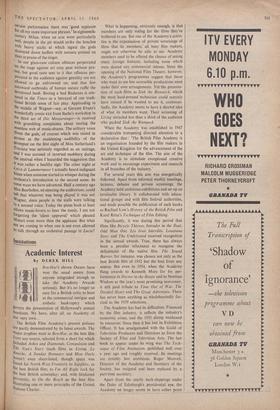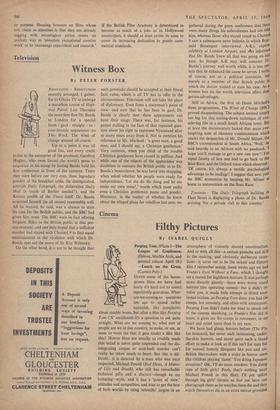Academic Interest
DEREK HILL By
The British Film Academy's present policies 4re partly demonstrated by its latest awards. The alaior trophies went to Ben-Hur, as the best film from any source, selected from a short list which included Ashes and Diamonds, Compulsion and he Nun's Story (such films as Living, Le Amiche, A Sunday Romance and Mon Oncle eren't even short-listed, though space was found for North West Frontier); to Sapphire, as the best British film; to I'm All Right Jack for the best British screenplay; and, with blinkered Perversity, to On the Beach as the best film illustrating one or more principles of the United Nations Charter. What is happening, obviously enough, is that members are only voting for the films they've bothered to see. But one of the Academy's activi- ties is the organisation of private screenings of films that its members,' all busy film makers, might not otherwise be able to see. Academy members used to be offered the chance of seeing many foreign features, including some which were denied any commercial release. Since the opening of the National Film Theatre, however. the Academy's programmes suggest that those who want to see less accessible productions must make their own arrangements. Yet the presenta- tion of such films as Sink the Bismarck, which the most hard-pressed technician could scarcely have missed if he wanted to see it, continues. Sadly, the Academy seems to have a shrewd idea of what its members want. Their screening of Living attracted less than a third of the audience who packed Sink the Bismarck.
When the Academy was established in 1947 considerable trumpeting directed attention to a declaration that: The British Film Academy is an organisation founded by the film makers in the United Kingdom for the advancement of the art and technique of the film. The aim of the Academy is to stimulate exceptional creative work and to encourage experiment and research in all branches of the industry.'
For several years this aim was energetically followed. Apart from informal weekly meetings, lectures, debates and private screenings, the Academy held ambitious exhibitions and set up an . invaluable library. It collaborated with educa- tional groups and with film festival authorities, and made possible the publication of such books as Rachael Low's History of the British Film and Karel Reisz's Technique of Film Editing.
Significantly, it was during this period that films like Bicycle Thieves, Intruder in the Dust, Odd Man Out, Les feta Interdits, Louisiana Story and The Undefeated received recognition in the annual awards. True, there has always been a peculiar reluctance to recognise the deficiencies of the native film. The Sound Barrier, for instance, was chosen not only as the best British film of 1952 but the best from any source. But even in 1954, when the Academy flung awards to Kenneth More for his per- formance in Doctor in the House and to Norman Wisdom as the year's most promising newcomer, it still paid tribute to Time Out of War, The Divided Heart and The Great Adventure. There has never been anything as wholeheartedly far- cical as the 1959 selections.
The Academy has had its difficulties. Financed by the film industry, it reflects the industry's economic crises, and the 1951 slump weakened its resources. Since then it has lost its Exhibition Officer. It has amalgamated with the Guild of Television Producers and Directors to form the Society of Film and Television Arts. The last book to appear under its wing was The Tech- nique of Film Animation, published well over a year ago and roughly received. Its meetings are notably less ambitious. Roger Manvell, Director of the Academy and Secretary of the Society, has resigned and been replaced by a part-time secretary.
Apart from the yearly back-slappings under the Duke of Edinburgh's presidential eye, the Academy no longer seems to have either point or purpose. Heaping honours on films whose sole claim to attention is that they are already sagging with meaningless prizes seems an unlikely way to 'stimulate exceptional creative work' or to 'encourage experiment and research.' If the British Film Academy is determined to become as much of a joke as its Hollywood counterpart, it should at least revise its aims to cover its increasing dedication to purely com- mercial standards.



































 Previous page
Previous page